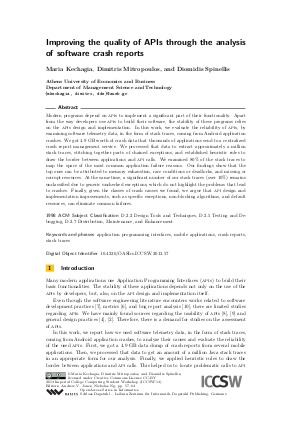Improving the quality of APIs through the analysis of software crash reports
Authors Maria Kechagia, Dimitris Mitropoulos, Diomidis Spinellis
-
Part of:
Volume:
2013 Imperial College Computing Student Workshop (ICCSW 2013)
Part of: Series: Open Access Series in Informatics (OASIcs) - License:
 Creative Commons Attribution 3.0 Unported license
Creative Commons Attribution 3.0 Unported license
- Publication Date: 2013-10-14
File

PDF
OASIcs.ICCSW.2013.57.pdf
- Filesize: 0.61 MB
- 8 pages
Document Identifiers
Subject Classification
Keywords
- application programming interfaces
- mobile applications
- crash reports
- stack traces
Metrics
- Access Statistics
-
Total Accesses (updated on a weekly basis)
0Document
0Metadata
Abstract
Modern programs depend on APIS to implement a significant part of their functionality. Apart from the way developers use APIS to build their software, the stability of these programs relies on the APIS design and implementation. In this work, we evaluate the reliability of APIS, by examining software telemetry data, in the form of stack traces, coming from Android application crashes. We got 4.9 GB worth of crash data that thousands of applications send to a centralized crash report management service. We processed that data to extract approximately a million stack traces, stitching together parts of chained exceptions, and established heuristic rules to draw the border between applications and API calls. We examined 80% of the stack traces to map the space of the most common application failure reasons. Our findings show that the top ones can be attributed to memory exhaustion, race conditions or deadlocks, and missing or corrupt resources. At the same time, a significant number of our stack traces (over 10%) remains unclassified due to generic unchecked exceptions, which do not highlight the problems that lead to crashes. Finally, given the classes of crash causes we found, we argue that API design and implementation improvements, such as specific exceptions, non-blocking algorithms, and default resources, can eliminate common failures.
Cite As Get BibTex
Maria Kechagia, Dimitris Mitropoulos, and Diomidis Spinellis. Improving the quality of APIs through the analysis of software crash reports. In 2013 Imperial College Computing Student Workshop. Open Access Series in Informatics (OASIcs), Volume 35, pp. 57-64, Schloss Dagstuhl – Leibniz-Zentrum für Informatik (2013)
https://doi.org/10.4230/OASIcs.ICCSW.2013.57
BibTex
@InProceedings{kechagia_et_al:OASIcs.ICCSW.2013.57,
author = {Kechagia, Maria and Mitropoulos, Dimitris and Spinellis, Diomidis},
title = {{Improving the quality of APIs through the analysis of software crash reports}},
booktitle = {2013 Imperial College Computing Student Workshop},
pages = {57--64},
series = {Open Access Series in Informatics (OASIcs)},
ISBN = {978-3-939897-63-7},
ISSN = {2190-6807},
year = {2013},
volume = {35},
editor = {Jones, Andrew V. and Ng, Nicholas},
publisher = {Schloss Dagstuhl -- Leibniz-Zentrum f{\"u}r Informatik},
address = {Dagstuhl, Germany},
URL = {https://drops.dagstuhl.de/entities/document/10.4230/OASIcs.ICCSW.2013.57},
URN = {urn:nbn:de:0030-drops-42721},
doi = {10.4230/OASIcs.ICCSW.2013.57},
annote = {Keywords: application programming interfaces, mobile applications, crash reports, stack traces}
}
